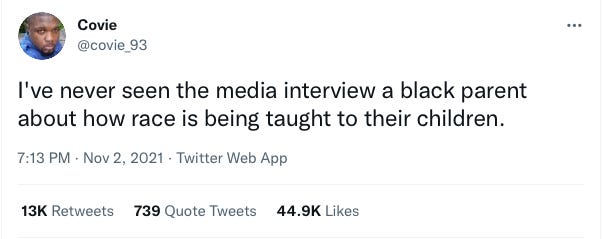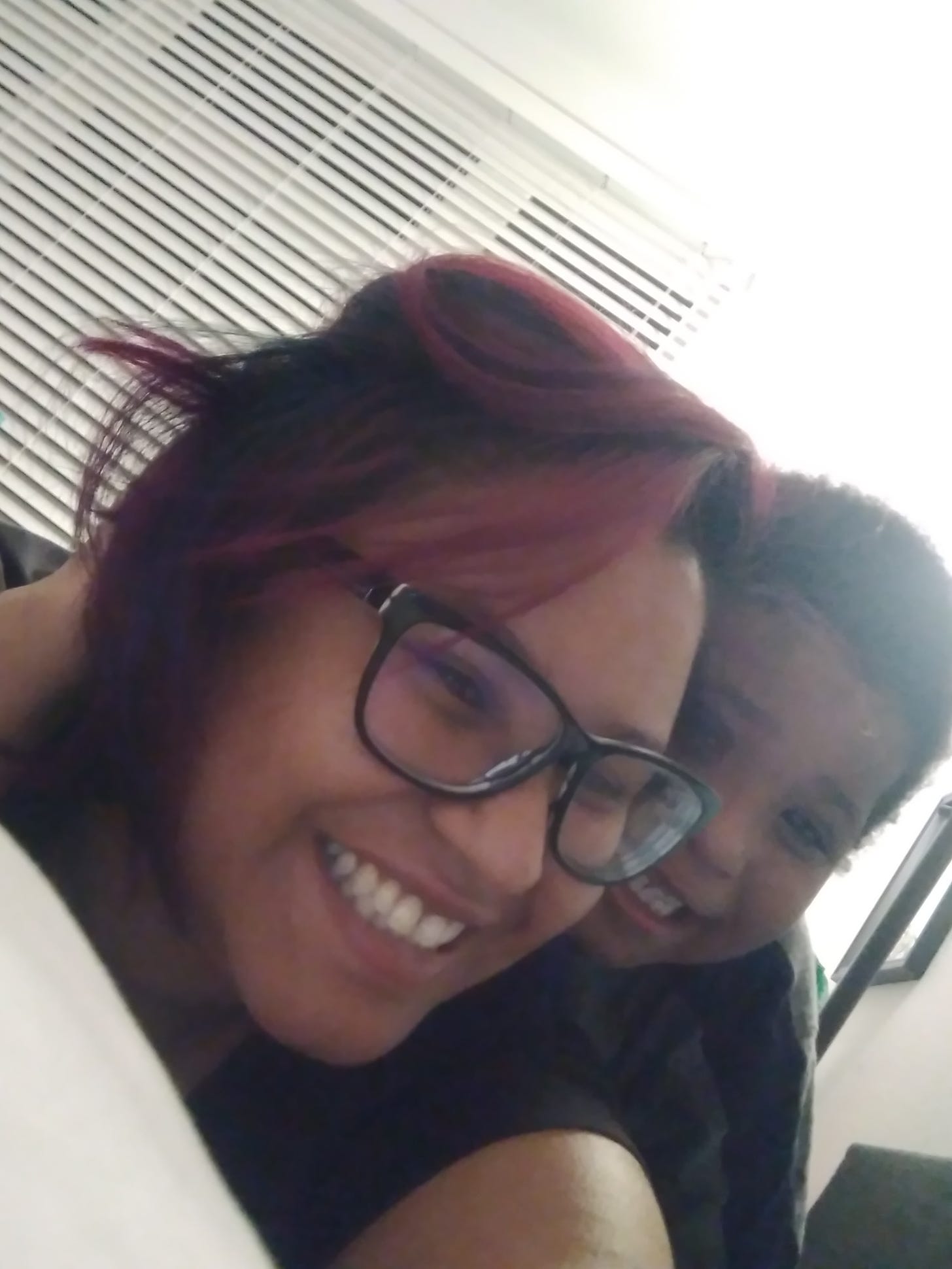'My kids deserve to know the truth'
5 questions for data analyst, event planner, and mother Amber Brown
Did you appreciate this tweet as much as I did?
It got me thinking that it would be great to interview one of the Black parents from my kid’s school about their thoughts on so-called CRT, which is really just American history, and I knew just who to ask. Amber Brown is one of those people who lights up a room every time she walks into it—loving, wildly effective (whether throwing together a crab feed fundraiser or mothering someone else’s child), and full of laughter. I adore her and I respect her.
So without further ado…meet Amber in all her wisdom.
Courtney Martin: Why did you choose to send your kids to Emerson?
Amber Brown: Okay, so this is a story. Justine was on a wait list for a charter. I had worked on a few campuses in the San Jose/Cupertino area for KIPP and I found out that they had a campus in the area. We had just moved to North Oakland and I thought it would be the best thing for Justine. Well, it was getting closer to the first day of school and Justine was still on the waitlist. I panicked and scrambled to find a plan B. I didn’t know Oakland that well and so I didn’t really know anything about the schools in our district. Justine's God mom mentioned Emerson. I got the chance to speak with former Emerson students and everyone was very positive. The best part: it was 10 minutes walking distance from my house. It was perfect.
We still had the wait list and I could take her out when they called her up. Well by the time that day came, Justine had no plans on going anywhere. She found a place that was home away from home to her. She thrived socially and academically. With a toddler coming up behind her there was no other choice than Emerson when it came time for her younger brother to start his journey. The staff already knew who he was and claimed him as a fellow cheetah before he ever enrolled.
When you imagine the education they get about American history, what is most important to you?
The accuracy of the part their people played in it is most important to me. Which is going to require a lot of study, because they tried to bury our stories. It’s more than celebrating the same ten Black people for a month, or renaming a holiday, or declaring a moment/experience in time as a holiday. It is vital for my brown skinned babies to see their people represented as key players in the foundation of America and that American History is not “the story of white people.”
There is a lot of controversy about how early history, particularly the more brutal realities, are taught to our kids. How do you think about what is developmentally appropriate as you teach your kids about race and racism and this country's origins?
Let me first say, there is time for everything. Let me also say that I grew up with a single mother who didn’t sugar coat anything. My sister and I grew up fast and learned about things before we should have. So when it comes to my kids, I kind of take the same approach. I’m not tying to expose my children to things beyond their years, but I will not allow them to be naive about it either. I don’t sugar coat anything with my kids. There’s always an appropriate way to address issues. Know your audience. But I’m honest with my kids.
You have kids so you understand that they are full of questions. And sometimes they will shock you. But they are human beings that deserve the same respect as any other human being. Age makes no difference.
So with that being said, I try to find a way to give an answer that is appropriate for their age. And it’s okay if that answer is: we can talk about this when your a little older. Sometimes you have to trust that if they are asking you about the issue, then they might be ready to discuss it. And they might have an opinion about it.
How did you learn about American history growing up and how do you feel about that now?
In grade school it was the same units. Everyone did the same reports on the same people. Pretty basic. But high school got pretty interesting. I had this history teacher, Mr. Schneider. He was someone that I had never encountered before—very eccentric and he had an infinite amount of knowledge in history. He was astonishing. He gave history life and depth. He developed in me an interest into the secrets that my ancestry holds. He taught me that if we don’t accept our past sins, we are doomed to repeat history. I think I would have enjoyed more passionate teachers like Mr. Schneider and would have appreciated a deeper understanding of being a product of America.
The system is always going to be set up for us to stay uninformed. And it’s teachers like Schneider that challenge that and try to give us a leg up. All they want is for us to have the basics and we can’t be okay with that. And that’s where, as a parent, I can step in and get them up to speed. History should start at home and not be dependent on what a group of “superiors” decide what my child should and shouldn’t know about their history.
I know your faith is a big part of your life. What does your Christian faith help you understand about what your kids can handle or deserve with regards to their knowledge of American history?
1 Timothy 4:12a says this: “Don’t let anyone look down on you because you are young,” which basically says that God can use anyone. And who’s to say that he isn’t using my children now. Perfect example is this interview. If it wasn’t for my kids, we wouldn’t have met and we wouldn’t be having this interview.
Just because my kids are young doesn't mean they don’t deserve to know the truth about who they are and where they come from. There is an appropriate way to address their questions and concerns about what is happening around them, but I don’t believe in portraying this false sense of reality that America is this great nation. God knows what my kids can handle. I have to trust that he is speaking to them and directing them even at such a young age.
As Christians we study the Bible because that is our history. We learn the traditions/ rituals and the why behind this life of ministry. We read the good and the bad because we can’t be effective if we don’t understand where we’ve come from. It’s the same thing. If we continue to bury those stories that are part of the foundation of America, we leave this world no better than when we entered it. We don’t leave much hope for our children, so why have them? My kids deserve to know the truth; they’ll let me know when they are ready for it. I just have to trust that when they do start seeking that knowledge, they will be ready for the answers.
In honor of Amber, we will be donating to Operation Christmas Spirit, an annual effort by her community of faith, Beth Eden Baptist Church.







I love Amber Brown's voice and perspective. This interview should be shared with members of the Organization of American Historians. Without the work of academics in fields like Black History and women's history, (gathered together in the 1619 Project among others) teachers in the early grades end up doing just as Amber describes, rehearsing the same few well-known facts and faces. Once again you find an under-served subject and give us a memorable interview that helps us imagine better ways of schooling for all.
Thank you for this wonderfully helpful interview. While many good parents figure out what they think their children can handle and need to learn, many of us don't know from personal experience in our childhoods how some information may impact children. As the mother of a brown skinned son, I had no idea what my well intended words might create in my son. Thank you again for sharing the teaching of another wise woman.